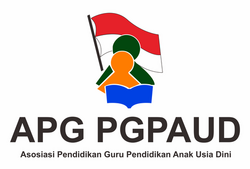Evaluasi Program Pengenalan Lapangan Satuan Pendidikan Bagi Calon Guru Pendidikan Anak Usia Dini
Abstract
Keywords
Full Text:
PDF (Bahasa Indonesia)References
Ali, M. (2003). The Use of Professional Development School for Developing Student-teachers Professional Competencies. In Proceeding Conference on Computers and Advanced Technology in Education (pp. 5–18).
Ali, M. (2019). Research Methods in Sustainability Education. Bandung: UPI PRESS.
Ali, M., & Hayat, B. (2019). Non-academic factors influencing students’ achievement: a study in the Indonesian madrasahs. International Journal of Learning and Intellectual Capital, 16(2), 180. https://doi.org/10.1504/ijlic.2019.098944
Arikunto, S. Safruddin,C & Jabar, A. (2008). Evaluasi Program Pendidikan: Pedoman Teoretis Praktis bagi Mahasiswa dan Praktisi Pendidikan. Jakarta: Bumi Aksara.
Buku Panduan. (2020). Program Pengenalan Lapangan Satuan Pendidikan PPLSP Program Studi Pendidikan Guru Anak Usia Dini Program Sarjana Pendidikan. Divisi Pendidikan Profesi dan Jasa Keprofesian P2JK Direktorat Akademik Universitas Pendidikan Indonesia
Creswell, J.W. (2014). Research Design: Qualitative, Quantitative, and Mixed Methods Approaches. California: Sage Publication, Inc
Djaali dan Muljono,P. (2004). Pengukuran dalam Bidang Pendidikan. Jakarta: Grasindo.
Fitzpatrick, Jody L., James R. Sanders, dan Blaine R. Worthen. (2004). Evaluation Program: Alternative Approaches and Practical Guidelines. Boston: Pearson Education, Inc.
Guba, E.G., and Yvonna S. Lincoln. (1989). Countenances of Fourth-Generation Evaluation: Description, Judgment, and Negotiation. ed. Dennis Palumbo. The Politics of Program Evaluation. California: Sage Publications, Inc.
Hendriawan, D. and Maulia, LNA. (2020). Integrated Teaching Material with Education for Sustainable Development on History Subject for High Schools Curriculum Development. Journal of Physics: Conference Series IOP Publishing doi:10.1088/1742-6596/1477/4/042030
Hendriawan,D., Ali, M., Rusman. (2019). High School History Education and Education for Sustainable Development. An Integrated Curriculum Approach. Journal of Physics: Conf. Series 1179 IOP Publishing doi:10.1088/1742-6596/1179/1/012048
Joint Committee. (1991). Ukuran Baku untuk Evaluasi Program, Proyek dan Materi Pendidikan. terjemahan Rasdi Ekosiswoyo. Semarang: IKIP Semarang Press.
Madaus, George F.,M S. Scriven, dan Stufflebeam, D L. (1983). Evaluation Models: Viewpoints on Educational and Human Services Evaluation. Boston: Kluwer-Nijhoff Publishing.
Mahmudi, Iwan (2011). CIPP: Suatu Model Evaluasi Program Pendidikan. Jurnal At-Ta’dib 125 Vol. 6, No. 1, Juni
Nitko, Anthony J. (2001). Educational Assessment of Students. New Jersey: Prentice Hall.
Owen, John M. (1993). Evaluation Program: Forms and Approaches. St. Leonards: Allen & Unwin Pty Ltd.
Patton, Michael Quinn. (2004). Overview: Language Matters. New Directions for Evaluation Volume 2000 Issue 86. (http://www3.interscience.wiley.com/journal/109752023/).
Scriven, Michael. (1976). The Intellectual Dimensions of Evaluation Research. makalah yang dipresentasikan dalam Northwest Research and Evaluation Conference. Seattle. (http:// www.google co.id / Michael.Scriven / The.Intellectual.Dimensionsof.Evaluation+Research).
Smith, M. F. (2004) Evaluation Utilization Revisited. New Directions for Program Evaluation. Volume 1988 Issue 39. November (http://www3.interscience.wiley.com/journal/109751386).
Stufflebeam, Daniel L., dan Anthony J. Shinkfield. (2007). Systematic Evaluation: A Self-Instructional Guide to Theory and Practice. Boston: Kluwer-Nijhoff Publishing.
Tim Pengembang MKDP Kurikulum dan Pembelajaran. (2013). Kurikulum dan Pembelajaran. Rajawali Pers Bandung
Undang-undang Republik Indonesia (2003) No 20 tahun tentang Sistem Pendidikan Nasional
Undang-undang Republik Indonesia (2015) No 14 Tahun tentang Guru Dan Dosen
Refbacks
- There are currently no refbacks.

This work is licensed under a Creative Commons Attribution-NonCommercial 4.0 International License.


.png)
